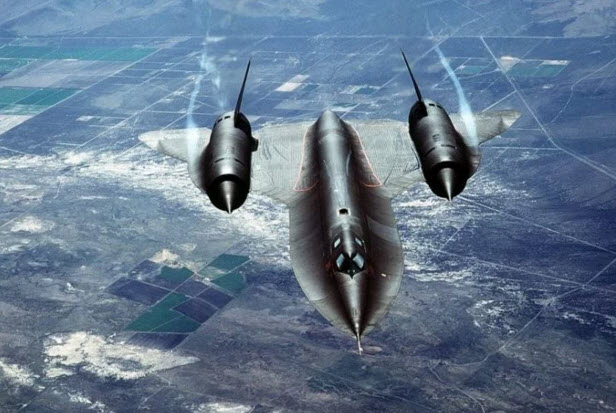Underreported: Grounding Our Eyes in the Sky
Dec 4 2019President Trump has, quite on his own and without consultation with Congress, much less the public, signaled his intent to withdraw from yet another international agreement, this one very much at risk to national security.
Immediately on taking office, he announced we would not go forward with the Trans-Pacific Partnership, the trade alliance knitting together twelve nations bordering on that ocean as a bulwark against China, which was not invited. That was largely an initiative of President Obama, so it had to go. So was the Paris climate accord, so Trump announced the U.S. would drop out as the only nation that would not at least take the pledge of reducing emissions. So was the nuclear accord with Iran an Obama achievement, which meant it had to be 
This is the SR-71 Blackbird spy plane, which is not
in use in Open Skies but, retired in 1999, deserves
to be remembered as the fastest of all aircraft
with a top speed of 2,193mph.
cancelled, brusquely double-crossing five partner nations while sanctioning Iran for living up to the agreement.
And now Trump has announced that he is considering asking Congress to void the Open Skies Treaty, a move that makes no sense, and creates alarming vulnerabilities by blinding us to threats around the world.
It was President Dwight Eisenhower's idea, a stunningly imaginative idea presented at the 1955 Geneva summit meeting, but not until 1992 accepted and signed as the Open Skies Treaty. It allows its 34 signatory nations to conduct surveillance flights in unarmed aircraft over any other member country's territory. It provides a means to spot military buildups and thereby thwart the secret moves by countries to launch surprise cross-border attacks. Correspondingly, for these decades it has dampened the paranoia of the unknown that could cause a country to ramp up its military and perhaps even counter an imagined threat with an attack on a neighbor.
Eyes in the skies let us see changes on the ground for appraisal by the intelligence services. Obviously, collaboration with Russia is our top priority use of the pact, and in fact we use it more than they. The U.S. flew over Russia 196 times between 2002 and 2016 while Russian observation planes flew only 71 trips over the U.S.. We even land at each others' air force bases for re-fueling.
There are rules: 72 hours notice must be given and a flight plan filed. Cameras are unclassified, subject to inspection, and can be of no tighter resolution than 30cm, which equates to each pixel representing a 30cm x 30cm square on the ground. Nations must share their output with any member country requesting it.
Behind the move to end the treaty? John Bolton and Senator Tom Cotton, both with crabbed views of treaties as surrendering U.S. sovereignty, no matter what reciprocal gains they can bring. Did Trump think to hear out anyone else? Cotton prefers satellites because they are cheaper, as if this is a serious budget item (think of all the military flights coursing the world as you read this). How many of the 34 countries can afford satellites? Not Ukraine, for example, which needs overflights to spot Russian troop movements. Also, satellites are less flexible; one must wait for their orbital arrival. A plane can take a second pass quickly if a shot is missed.
It is true that Russia can use its flights to map our infrastructure to plan targeting in the event of a war. But then, we are probably doing the same. The treaty brings together the militaries of the member nations which builds trust. Reliance only on satellites would eliminate those valuable contacts.
Also, Russia cheats. Countries can keep visiting planes 10 kilometers from their borders with non-signatory states, according to the treaty, but Russia uses that proviso to keep us from the territories they split off from Georgia with the pretense that they are not really Russian. We were disallowed from flying over their massive Center-2019 military exercise. And they restrict us to 500 kilometer flights above Kaliningrad, a sliver sandwiched between Poland and Lithuania which bristles with missiles. But tearing up a treaty rather than working out such disputes and differences is a drastic step that will leave America with nothing.
Wind of Trump's ill-considered move brought forth a Wall Street Journal op-ed by George Schultz, secretary of state from 1982 to 1989; William Perry, secretary of defense from 1994 to 1997; and Sam Nunn, senator from Georgia and chairman of the Armed Services Committee — three who should make the current president realize how little he knows by comparison and who made many of these points calling the unilateral elimination of U.S. participation in the treaty "a grave mistake".
Please subscribe if you haven't, or post a comment below about this article, or
click here to go to our front page.

